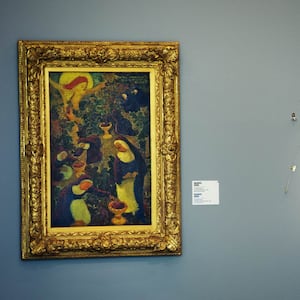The former director of the Louvre Museum in Paris and two French Egyptologists were taken into custody in France, accused of helping traffic millions of dollars worth of stolen art, some of which is alleged to have ended up in the Metropolitan Museum of Art in New York City.
Jean-Luc Martinez was indicted late Wednesday for “complicity in fraud in an organized gang and laundering by false facilitation of the origin of property” after enduring a lengthy interrogation by art detectives in Paris.
The Egyptologists were briefly held and then released pending further investigation, which French media speculate could mean cooperating against Martinez.
ADVERTISEMENT
The men have been under scrutiny over the provenance of hundreds of items of art that investigators say they “turned a blind eye” to when they bought it. Provenance is akin to a passport for ancient artifacts that prove where it is from and how it left the country of origin, either through sale or loan. In the early 2000s, scores of American museums that had bought looted art through shady dealers in Italy and Greece were forced to return the treasures to the countries of origin.
Much of the alleged trafficked art is tied to the bust up of a ring of art experts-turned-traffickers who are alleged to have “laundered” stolen antiquities through Egypt, Syria, Libya, and Yemen during the height of the Arab Spring. During that time, it became easy to falsify provenance documents that are normally needed to export ancient artifacts.
Martinez was taken in for questioning by France’s primary office that fights art trafficking and was reportedly grilled over a number of pieces of art he signed off on, including the infamous golden coffin from the 1st century BC dedicated to Nedjemankh that the Metropolitan Museum of Art in New York bought for a cool $4 million in 2017, and then had to return it to Egypt when it was sequestered by the district attorney’s office. The sarcophagus was sold to the Met by Christophe Kunicki, who was charged in June of 2020 with criminal conspiracy, gang fraud, and art laundering.
French police are focusing in on other illicit art Kunicki sold to Martinez for the Louvre’s Abu Dhabi branch, valued at more than $53 million, which they believe Martinez very well knew lacked verifiable provenance. Among those priced pieces are five highly valuable pieces of Egyptian art including a pink granite slab depicting King Tutankhamun.
But once big museums like the Louvre or Met own these pieces, they can often legitimize the paperwork and sell them on. French police said Thursday they believe Martinez was well aware of the fraudulent nature of his purchases.
A representative for the Met told the Art Newspaper that they were duped and that “employees were deceived by this criminal conspiracy and the museum has been fully co-operative throughout this investigation and will continue to be so.”
It is unclear if the Met cooperated in the investigation against Martinez, who was the director of the Louvre from 2013 to 2021. After his resignation in good terms, he was appointed by the French government as a special ambassador for international cooperation on cultural heritage. He has denied any wrongdoing through his lawyers.






